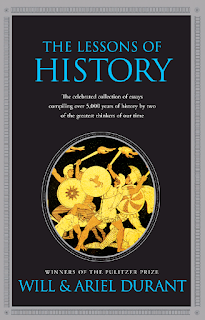This book review was written by Eugene Kernes
“History has a good word to say for all of them, and for government in general. Since men love freedom, and the freedom of individuals in society requires some regulation of conduct, the first condition of freedom is its limitation; make it absolute and it dies in chaos. So the prime task of government is to establish order; organized central force is the sole alternative to incalculable and disruptive force in private hands.” – Will Durant, and Ariel Durant, Chapter X: Government and History, Page 61
“So the services of aristocracy did not save it when it monopolized privilege and power too narrowly, when it oppressed the people with selfish and myopic exploitation, when it retarded the growth of the nation by a blind addiction to ancestral ways, when it consumed the men and resources of the state in the lordly sport of dynastic or territorial wars. Then the excluded banded together in wild revolt; the new rich combined with the poor against obstruction and stagnation; the guillotine cut off a thousand noble heads; and democracy took its turn in the misgovernment of mankind.” – Will Durant, and Ariel Durant, Chapter X: Government and History, Page 63
“If education is the transmission of civilization, we are unquestionably progressing. Civilization is not inherited; it has to be learned and earned by each generation anew; if the transmission should be interrupted for one century, civilization would die, and we should be savages again. So our finest contemporary achievement is our unprecedented expenditure of wealth and toil in the provision of higher education for all.” – Will Durant, and Ariel Durant, Chapter XIII: Is Progress Real?, Page 93
Is This An Overview?
Human behavior is affected by many
factors. The values of the factors
change, but the methods in history repeat, just with different details. Not much has changed in the character of
people, as the desires are the same but expressed differently. Same strategies used but with different
associations. Humans are evolutionary
trained to be competitive for resources, for even cooperation is a tool and
form of competition. Climate, geography,
and nature can limit human capacity, but the limits were overcome by human
ingenuity. Knowledge can be used to
improve society, or decimate it. Making
those who resist change as important as those who inspire change. Religion and government have been used to
enable cooperation between people.
Religion provides a moral code that is above even the most powerful
people. Government enforces laws that
provide freedom by restricting absolute freedom’s destructive capacity. Civilization is dependent on education, for
civilization is not inherited.
What Are Some More Lessons Of History?
All historians are partial, for even those who think they are not, choose material and subjects based on their partiality. What normally makes history are the exceptional events, rather than most of history which is more mundane.
Moral laxity is not a sign of moral decay, but of a transitioning moral code. Religions rise and fall, only to be resurrected. Moral life used to be aided by religion, but contemporary society does not use religion.
War is the norm, and it part of the competitive process. The individual is restrained by morals and laws, but the state does not have such restraints.
Inequality is cyclical.
An inevitable concentration of wealth, which can become intolerable that
inspires the redistribution of wealth using various means. Dictators rise when wealth distribution is
inappropriate. It was because power has
been abused that lead to revolution that gave rise to democracy, which has
taken its turn in misgovernance.
Caveats?
The focus is on broad categories,
and describing their trends over the course of history. There is a lack of information on any
specific society or era. This book
prompts the reader to search for that information, and provides a way to
interpret the events.
